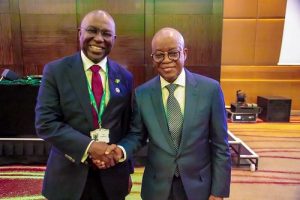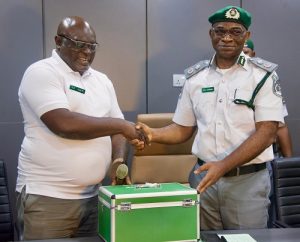NIMASA and New Approach to Cabotage Shipping Regime
By Francis Ugwoke
It is exactly 16 years since the cabotage shipping regime was introduced in Nigeria. A baby of the National Maritime Authority (NMA) which is now known as NIMASA, cabotage was designed to achieve a wide range of objectives in favour of the nation’s indigenous shipping industry and to a large extent the national economy. Industry chieftains, particularly members of the Indigenous Shipowners Association of Nigeria (ISAN) apparently worried about the domination of foreign shipping companies in coastal trading championed the introduction of cabotage policy. The stakeholders had then drawn the attention of the leadership of the NMA and the Ministry of Transport to Jones Act in the United States and some other countries which forbid foreign firms from trading in inland territorial waters. Convinced by their argument, both the executive and the legislative arms of the government worked harmoniously to ensure that the bill was passed into law. Unlike some bills that spend years before being passed, Cabotage Bill sailed into law under a short space of time because of the understanding that it will bring about multiplier effect on the national economy. The assent of the Bill by former President Olusegun Obasanjo was well celebrated by stakeholders in the maritime industry.
Cabotage Journey
The objective of cabotage was mainly for indigenous shipping companies to take full control of shipping activities within the coastal waters. And this is ideal. The scenario in the shipping industry then was that foreign shipping companies dominated shipping trade locally in such a way that indigenous companies could not compete. The Nigerian shipowners complained of being denied contracts by both the Nigerian National Petroleum Corporation (NNPC) and oil majors involved in importation of refined petroleum products. The claim was that many of the local shipping companies did not have the capacity. But Nigerian shipowners who denied this accused NNPC and multinational oil companies of clear discrimination. Cabotage was therefore introduced to take care of this problem as it would spell out clearly that foreign vessels would not be allowed to participate in coastal movement of goods within Nigeria’s coastal waters except with waivers. The regime also took care of manning by members of the crew on board such vessels localizing it except on waivers. For the Nigerian shipowners, since they cannot compete with foreign shipowners in international routes, cabotage regime will then protect their interests.
However, cabotage shipping regime from all indications has had a rough journey in the past 16 years. It is very unfortunate that the policy failed to meet the expectations of the Nigerian shipowners, a development that has compelled the current management of NIMASA to work out new ways to address the issue.
Challenges
Former Interior Minister and former Secretary of ISAN, a serial owner of ships, Capt Emmanuel Iheanacho, had captured the shipping scenario years after cabotage was introduced. Iheanacho had in an interview granted The Shipper last year said, “ Cabotage really has not helped us in a significant way. If anything, it has turned the tables and whereas before 2003, there were Nigerian companies who operated a limited tonnage, good tonnage….. but once you put that law in place the people who were turned out to be our competitors, foreign shipowners found loopholes in the specification of the cabotage law and they operated it in such a way that it now excluded our people. How did it exclude out people ? They introduced things like shipping vetting service where a foreign shipowner bringing a ship , and if I have to compete with him (for instance in the case of tanker trade) to lift some of our products will now be in a position to vet our own ships and say, I want this ship and I don’t want this ship. And then we had a situation where those foreigners became very bold and even introduced coastal vessels themselves. They will get a cabotage waiver and when it came to vetting , they will prefer to work with those vessels. And so, we lost out because nobody was using us”.
New Approach by NIMASA
Worried about the sad stories of cabotage over the years, the current management of NIMASA has been working hard to address the problem. This was apparently after series of stakeholders engagement on way forward by the Director General of NIMASA, Dr. Dakuku Peterside.
The first step by NIMASA was to look at the waiver regime which shipowners have been complaining about. The agency had as part of the efforts to address the issue of waiver published a marine notice in 2017 of the new Cabotage compliance strategy saying it will no longer entertain any form of application for manning waivers save for captains and chief engineers. This was for six months trial run during which the agency said the number of Nigerians employed on board vessels doubled. The agency had in 2018 decided to extend it after series of engagement with stakeholders to stop the waivers regime in the Cabotage trade.
Early this year, the agency announced its decision to end the controversial waiver clause contained in the Cabotage Act. But in doing so, this will be implemented in phases for a period of five years. Peterside said the agency has set a five-year timeline to end the cabotage waiver. He told industry stakeholders that the move became necessary to end the poor showing on local shipping companies in local maritime trade. He explained that stopping the waiver in phases will enable indigenous ship owners take charge of the Nigerian coastal trade.
He assured that the agency was determined to bring to an end the waivers regime so as to allow cabotage flourish in Nigeria.
Dakuku said, “ for a very long time, indigenous operators that have been very concerned about Cabotage waivers; their concerns coming from the fact that it appears that waivers is now a norm instead of exception and since they have been wondering when are we going to come to the end of this Cabotage waivers regime, I want to say to them NIMASA has ended your cry, NIMASA is on the same page with you. We have decided to bring to an end the waivers regime so that Cabotage will flourish in Nigeria and Nigerians will benefit from coastal trade”.
The DG added that the plan of the agency is to give Nigerian operators a strong footing in the Cabotage regime.
He added, “As you know, it is the desire of every operator that we end the regime of waivers in the Cabotage trade. And a lot of our people are concerned that we have not been able to build vessels in this country. But at NIMASA, we have taken strategic steps in the area of ship building.
“The country is looking at Ajaokuta Steel Mill again and I believe that once Ajaokuta come on stream, it will remarkably improve our fold in ship building.
“Those engagements are going on. It is even going on at the highest level of government. We are engaging the office of the Vice President to look at the possibility of creating a number of incentives for those who can build vessels in this country and we believe if that is done, a number of persons and entrepreneurs will invest in building vessels in this country.
“We are even working in partnership with the Nigerian Content Development Monitoring Board (NCDMB). To that extent, we have commissioned a survey and audit of all building yards in this country to identify a level of support we can give to enable them come back on stream fully.
“A bigger picture is that in the next five years, we want certain category of vessels to be built in the country so that we will put an end to bring literally all vessels we need from outside the country and create jobs outside the country, whereas we are creating unemployment by patronising foreign built vessels.
“That is strategic step we have taken in the area of owning vessels. We have also taken a number of steps to support local players so that they can own more vessels. We have engaged the Ministry of Finance and Customs to create a special tax regime to Nigerians who will bring in vessels into the country.”
Gains of Cabotage Compliance Strategy
Shipping is capital intensive, but also very lucrative. The problem in the Nigerian environment had been domination of the trade by foreigners. Analysts believe that the moment Nigerian shipping companies are patronized by both the NNPC and multinational oil companies, they will be in a position to make more money. This will in turn enable them to acquire new vessels that can help in sea time training of so many cadets who have had to rely on NIMASA for overseas training. This will equally lead to the sector employing more Nigerians. The view expressed by analysts holds a lot of water considering the statement credited to the NIMASA DG recently in which he said that the agency had already keyed into the vision of the President by creating over 7000 jobs in the last six months through the New Cabotage Compliance Strategy. Dakuku said the agency will do more as there are vast opportunities in the maritime sector.
Dakuku told journalists that the agency had come up with strategies that had ensured a steady rise in the number of jobs created through manning, crewing, stevedoring, and dockworkers engagement. According to him, this has positioned the maritime industry as one of the key sectors that will support the realisation of President Muhammadu Buhari’s pronouncement during his Democracy Day broadcast of bringing 100 million Nigerians out of poverty in 10 years. He said Nigeria’s maritime industry possesses a vast opportunity for economic growth.
The implementation of a five-year plan for the cessation of waiver, the NIMASA DG said has encouraged the employment of more Nigerians by vessel owners. He disclosed that the new Cabotage regime has continued to yield positive results with more Nigerians being engaged in various sub-sectors of the maritime industry.
Dakuku said, “We have always known that the political will to deal with the issue of waivers in the Cabotage regime had been the challenge in the past. Our pronouncement and implementation of the New Cabotage Compliance Strategy has led to the engagement of over 7000 Nigerians in various sub-sectors within the industry. This has also resulted in 32% increase in vessels operating under the Cabotage regime in the first two quarters of 2019”.





